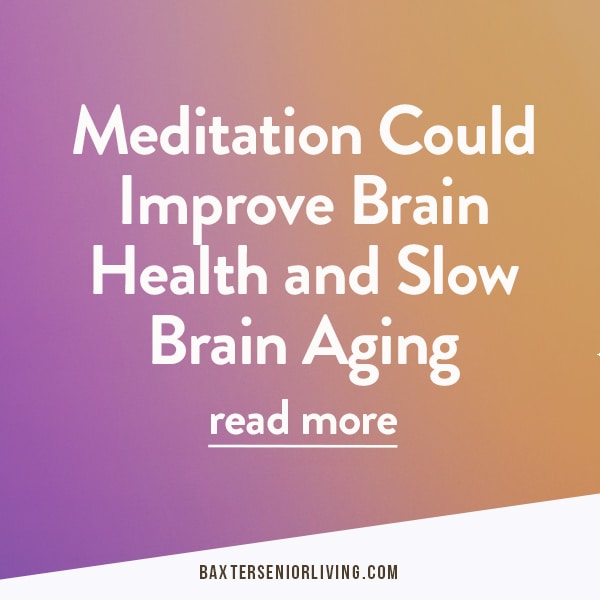Who couldn’t benefit from a dose of calm? To feel calmer and more serene, some people turn to meditation, a practice that’s been around for thousands of years. Nowadays, more and more people are taking time to practice simple meditation techniques to ease stress. But did you know that frequent meditation may be beneficial for the health of your brain and may even slow cognitive aging?
Meditation and Brain Aging
You might be skeptical that the simple practice of meditation slows brain aging. A group of researchers at the University of Wisconsin put meditation to the test. Buddhist monks have a long history of meditation and do so daily.
The researchers examined the brain of one Buddhist monk who meditated daily using brain imaging scans. They examined his brain several times over an 18-year period and compared his brain to adults who didn’t meditate. Although the Buddhist monk had a chronological age of 41 years, his brain scan was consistent with the brain of a 33-year-old.
Another study carried out by researchers at UCLA found that people who meditate have less volume loss in key areas of the brain involved in memory and cognition. Plus, they have more connectivity between regions of the brain. The researchers also found that meditation seems to preserve white matter tissue in the brain.
Other research shows that meditation increases gray matter in the cortex of the brain. Gray matter is where most information processing occurs in the brain. It makes up about 40% of the brain. White matter speeds up communication from areas of gray matter in the brain. So, it facilitates information transmission. It appears that meditation may slow the aging of both.
How Might Meditation Slow Brain Aging?
Scientists don’t have a definitive answer to how meditation slows brain aging, but they have some theories. Think about how calm and relaxed you feel when you meditate. You feel at one with all that surrounds you; your heart rate slows, and your blood pressure drops. These are all positive for brain health. One contributor to brain aging is damage to blood vessels in the brain due to cardiovascular disease and high blood pressure. If meditation drops your blood pressure and reduces the activity of your sympathetic nervous, it bodes well for the vessels in your brain.
Meditation Lowers Stress Hormones
Another way meditation may retard brain aging is by reducing the stress hormone cortisol. Your adrenal glands (tiny glands just above your kidneys) release cortisol when you’re under physical or mental stress. It serves a useful purpose; it helps your body release glucose into your bloodstream, so it has more energy. But if cortisol stays up, it has negative effects on many aspects of physical functioning, including brain health.
Research shows that humans with a high cortisol level have less volume in the hippocampus of their brain and memory deficits than those with a normal cortisol level. This may explain the link between chronic stress and dementia. The good news? Meditation helps lower cortisol in people under stress.
Meditation Improves Sleep Quality
Most people don’t realize how important sleep is for brain health. During the deep stages of sleep, your brain performs a “clean up” function. During the clean-up, it removes misfolded proteins that block healthy brain communication through channels called the g-lymphatics. You may be familiar with some of these damaged proteins that accumulate in the brain and become more numerous with aging, including beta-amyloid. People with Alzheimer’s disease have a build-up of damaged proteins called beta-amyloid in the brain.
The improved sleep quality meditation brings about makes your brain more efficient at removing damaged proteins that can clog up communication between different parts of the brain. So, meditation is a clean-up for the brain, making it faster, more efficient, and younger.”
Meditation Improves Mental Health
Studies show that meditation can protect against mood disorders like anxiety and depression by helping you combat stress and deal with negative emotions. Meditation teaches you how to pay attention to your thoughts and feelings without judging them or being overwhelmed by them. It keeps your mind in the present, so you don’t focus on situations that frighten or worry you. That’s important, since studies link depression with a faster rate of brain aging.
The Bottom Line
Meditation is a way to calm your mind, improve sleep quality, and improve brain health. It helps clear your mind of the constant stream of thoughts, emotions, and distractions that create stress, worry, interfere with sleep, and raise the stress hormone cortisol. Studies show it may “rewire” your brain in a way that increases connectivity and slow cognitive decline related to aging.
Medication can be an incredibly powerful tool. Are you ready to add meditation to your list of brain-healthy habits?
References:
- Nagesh Adluru, Cole H. Korponay, Derek L. Norton, Robin I. Goldman &
- Richard J. Davidson (2020): BrainAGE and regional volumetric analysis of a Buddhist monk: a
- longitudinal MRI case study, Neurocase, DOI: 10.1080/13554794.2020.1731553
- “Does Meditation Change the Brain? Can It Slow Aging ….” 19 Jul. 2011, psychologytoday.com/us/blog/brain-sense/201107/does-meditation-change-the-brain-can-it-slow-aging.
- “Meditation and Mental Health | Psychology Today.” 17 Jul. 2019, psychologytoday.com/us/blog/balanced/201907/meditation-and-mental-health.
- “Meditation: In Depth | NCCIH.” nccih.nih.gov/health/meditation-in-depth.Nagesh Adluru, Cole H. Korponay, Derek L. Norton, Robin I. Goldman & Richard J. Davidson (2020):
- “High cortisol levels are associated with cognitive ….” 23 Aug. 2013, sciencedirect.com/science/article/pii/S0009898113001484.
- “Frontiers | High Cortisol and the Risk of Dementia and ….” frontiersin.org/articles/10.3389/fnagi.2019.00043/full.
- S. W. Lazar, C. E. Kerr, R. H. Wasserman, et al., “Meditation Experience Is Associated with Increased Cortical Thickness,” Neuroreport (November 28, 2000), 1893-1897.
- BrainAGE and regional volumetric analysis of a Buddhist monk: a longitudinal MRI case study, Neurocase, DOI: 10.1080/13554794.2020.1731553.

